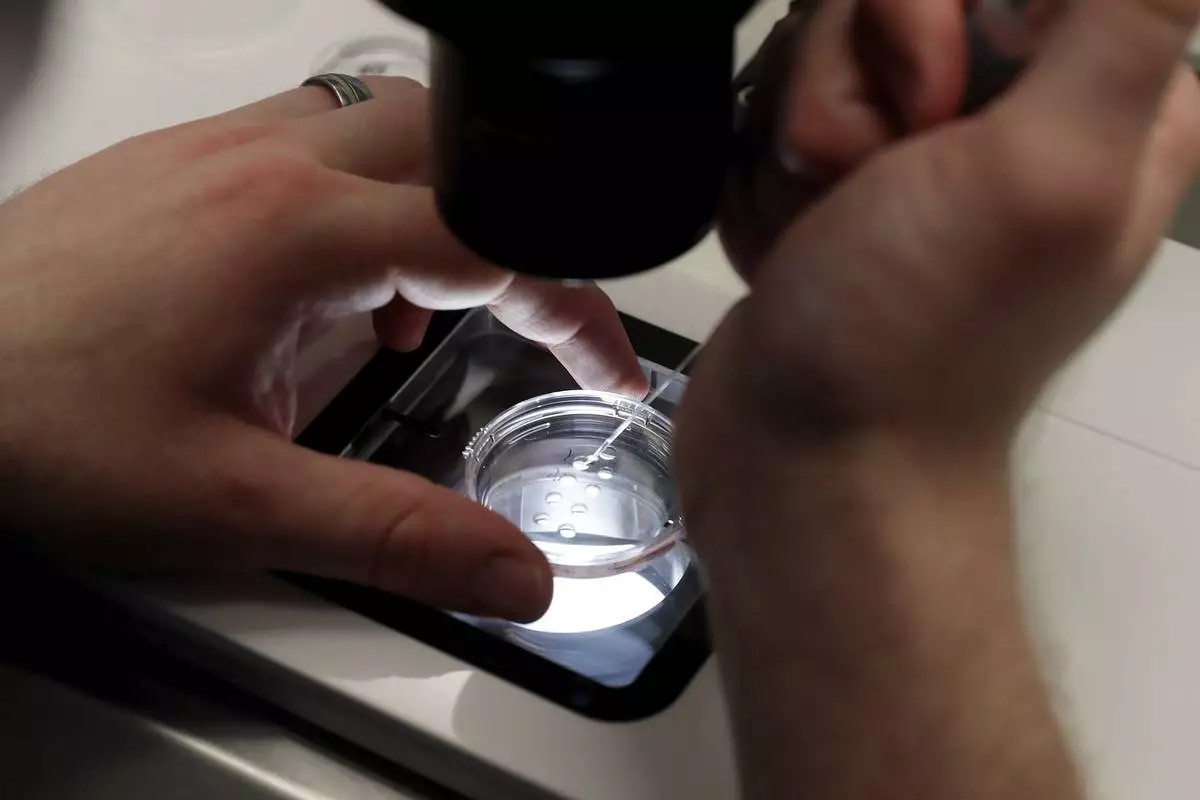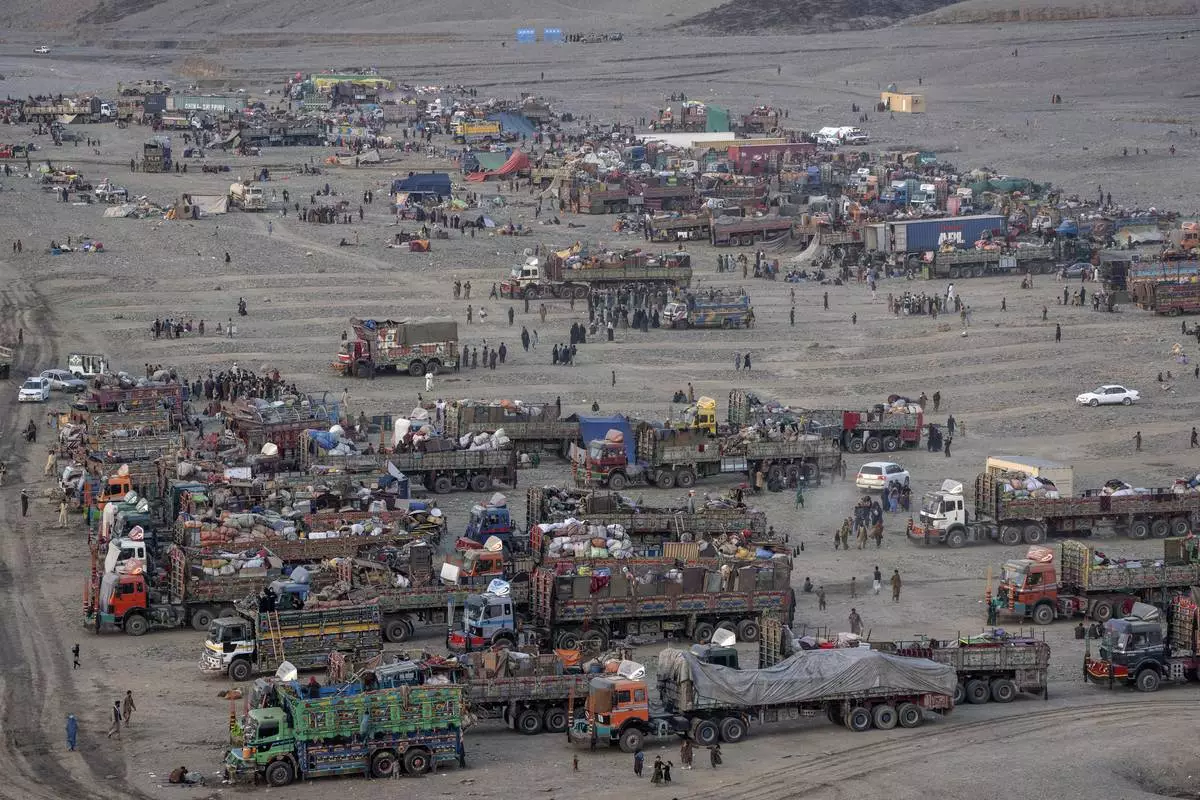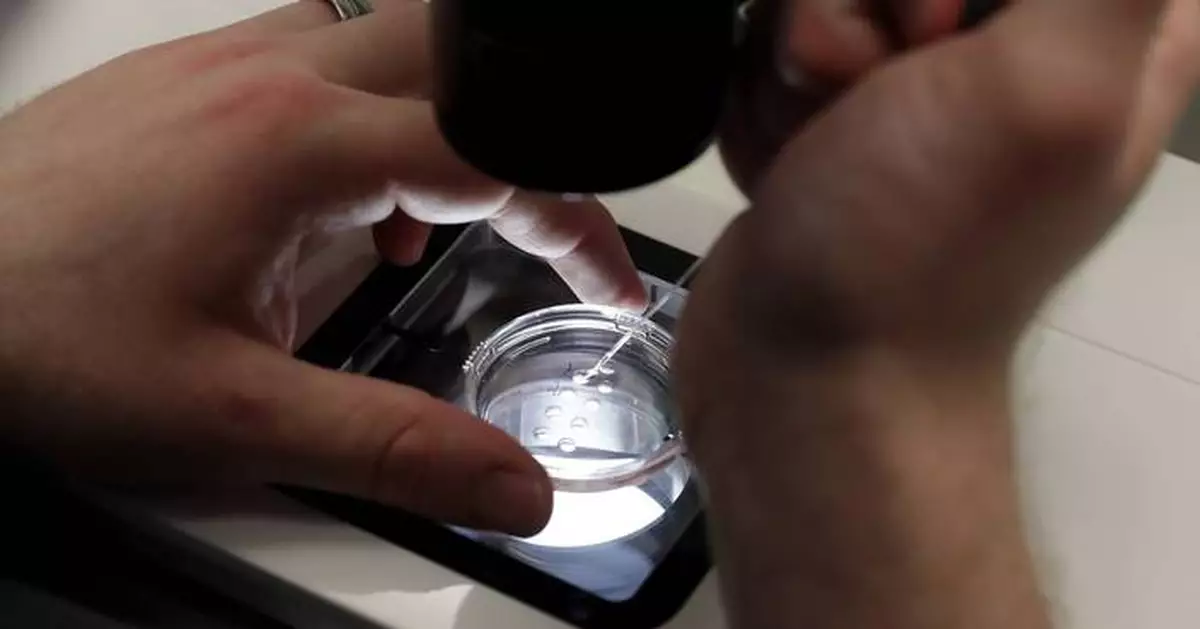ATLANTA (AP) — A Georgia bill to codify the right to in vitro fertilization got overwhelming approval from the state Senate Thursday, setting it up to move to Gov. Brian Kemp's desk for his signature.
The House approved it last month, and the chamber will likely approve the final version Friday.
Republican Rep. Lehman Franklin drew bipartisan support for his bill, which he introduced in part over concerns about access to the treatment after the Alabama Supreme Court ruled last year that frozen embryos can be considered children under state law. After multiple rounds of IVF and a plan to adopt fell through, Franklin and his wife Lorie were finally able to conceive using the treatment. They're expecting a baby girl this summer.
“We wanted to find the language to safeguard it so we didn't have any kind of experience that other states might have had in the past,” Franklin said in an interview. “We want to get ahead of the game and make sure that we're safe."
Lorie Franklin joined her husband in the House and Senate when each chamber voted on the bill.
Some conservatives are skeptical of IVF because some embryos are discarded in the process. Franklin said floating concerns are “satellite issues that are worthy of debate," that could be addressed separately.
Legal experts say Georgia's current law does not pose a significant threat to IVF the way Alabama's constitution did.
A handful of states have “personhood” laws, which give rights to fertilized eggs, embryos or fetuses. Georgia's personhood law defines a fetus as a person and is one of the broadest, giving rights such as tax breaks and child support to unborn children.
But the Alabama ruling relied on the wording of the state's wrongful death statute and language added to the Alabama Constitution in 2018 protecting the “rights of the unborn children.” After the ruling, Alabama's governor signed legislation protecting IVF providers from legal liability.
Still, the bill's passage comes a day after a hearing on House Bill 441 that would make most abortions a homicide and recognize fetuses as people from the point of fertilization. House Republican sponsors of that bill voted in favor of Franklin’s bill protecting IVF access. But doctors told the committee the bill would bar access to IVF.
“Ultimately, I don’t think they’re going to be able to go all the way with personhood and simultaneously protect IVF the way they want to,” said Duke University law professor Jolynn Dellinger in an interview last month, referring to those who want to push the laws defining personhood further.
For now, though, IVF access will remain protected in Georgia. President Donald Trump has also affirmed his support for IVF access, including through an executive order aiming to reduce its cost.
Republican House Speaker Jon Burns made the bill to protect IVF a priority this session.
Kramon is a corps member for The Associated Press/Report for America Statehouse News Initiative. Report for America is a nonprofit national service program that places journalists in local newsrooms to report on undercovered issues. Follow Kramon on X: @charlottekramon.

FILE - Lab staff prepare small petri dishes, each holding several 1-7 day old embryos, for cells to be extracted from each embryo to test for viability at the Aspire Houston Fertility Institute in vitro fertilization lab Tuesday, Feb. 27, 2024, in Houston. (AP Photo/Michael Wyke, File)
PESHAWAR, Pakistan (AP) — Pakistan plans to expel 3 million Afghans from the country this year, as a deadline for them to voluntarily leave the capital and surrounding areas expired on Monday.
It’s the latest phase of a nationwide crackdown launched in October 2023 to expel foreigners living in Pakistan illegally, mostly Afghans. The campaign has drawn fire from rights groups, the Taliban government, and the U.N.
Arrests and deportations were due to begin April 1 but were pushed back to April 10 because of the Eid al-Fitr holidays marking the end of Ramadan, according to government documents seen by The Associated Press.
About 845,000 Afghans have left Pakistan over the past 18 months, figures from the International Organization for Migration show.
Pakistan says 3 million Afghans remain. Of these, 1,344,584 hold Proof of Registration cards, while 807,402 have Afghan Citizen Cards. There are a further 1 million Afghans who are in the country illegally because they have no paperwork.
Pakistan said it will make sure that Afghans do not return once deported.
Authorities wanted Afghan Citizen cardholders to leave the capital Islamabad and Rawalpindi city by March 31 and return to Afghanistan voluntarily or be deported.
Those with Proof of Registration can stay in Pakistan until June 30, while Afghans bound for third-country resettlement must also leave Islamabad and Rawalpindi by March 31.
Authorities have said they will work with foreign diplomatic missions to resettle Afghans, failing which they will also be deported from Pakistan.
Tens of thousands of Afghans fled after the Taliban takeover in 2021. They were approved for resettlement in the U.S. through a program that helps people at risk because of their work with the American government, media, aid agencies, and rights groups.
However, President Donald Trump paused U.S. refugee programs in January and 20,000 Afghans are now in limbo.
“No Afghan officials to be made part of any committee or formal decision-making process,” one of the documents said about the expulsion plans.
A spokesman for Afghanistan’s Refugee Ministry, Abdul Mutalib Haqqani, told The Associated Press that Pakistan was taking decisions arbitrarily, without involving the U.N. refugee agency or the Taliban government.
“We have shared our problems with them, stating that unilaterally expelling refugees is neither in their interest nor ours,” said Haqqani. “It is not in their interest because expelling them in this way raises hatred against Pakistan.
“For us, it is natural that managing so many Afghans coming back is a challenge. We have requested they should be deported through a mechanism and mutual understanding so they can return with dignity.”
Two transit stations will be set up in the northwest province of Khyber Pakhtunkhwa to help with deportations. One will be in Nasir Bagh, an area in the Peshawar suburbs. The second will be in the border town of Landi Kotal, some 7 kilometers from the Torkham crossing.
It is not clear what will happen to children born in Pakistan to Afghan parents, Afghan couples with different document types, and families where one parent is a Pakistani citizen and the other is Afghan. But officials indicated to the AP that social welfare staff will be on hand to help with such cases.
Omaid Khan, 30, has an Afghan Citizen Card while his wife has Proof of Registration. According to Pakistani government policy, he has to leave but his wife can stay until June 30. Their two children have no documents, including passports or identity cards from either country.
“I am from Paktia province but I have never been there and I am not sure about my future,” he said.
Nazir Ahmed was born in the southwest Pakistani city of Quetta and has never been to Afghanistan. His only connection to the country was through his father, who died in Quetta four years ago.
“How can we go there?” said Ahmed, who is 21. “Few people know us. All our relatives live in Quetta. What will we do if we go there? We appeal to the Pakistani government to give us some time so we can go and find out, at least get some employment."
—-
Associated Press writer Abdul Sattar contributed to this report from Quetta, Pakistan.

FILE - Afghan refugees settle in a camp near the Torkham Pakistan-Afghanistan border, in Torkham, Afghanistan, Nov. 3, 2023. (AP Photo/Ebrahim Noroozi, File)


















































